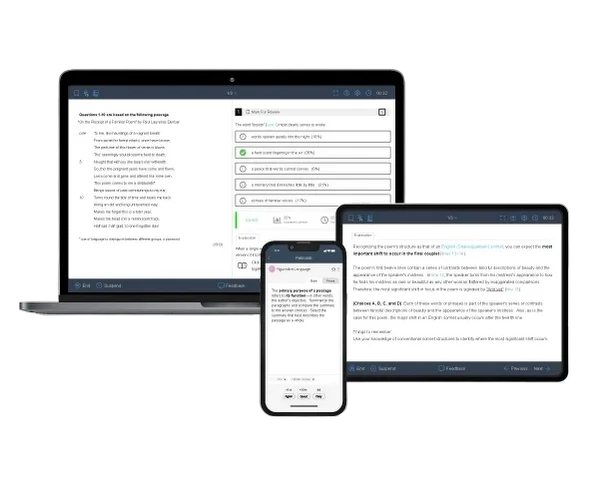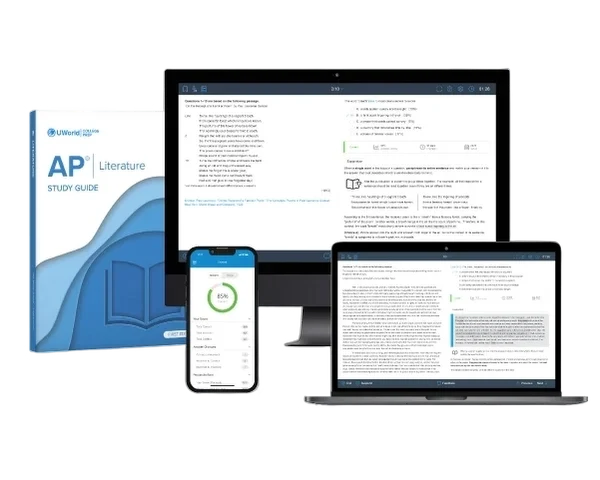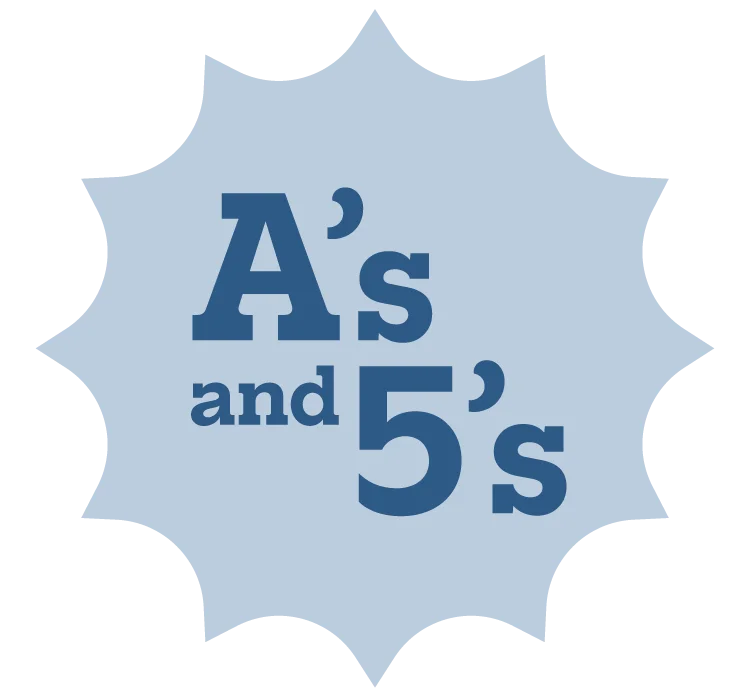The AP Lit exam has 55 multiple-choice questions (MCQs). You will have 1 hour to complete this section of the test, which counts for 45% of your score. Each question has the same weight and covers 7 of the 9 course units. Here is how each skill is weighted:
| Skill Category | Exam Weight |
|---|---|
| Function of character | 16-20% |
| Function of setting | 3-6% |
| Function of plot and structure | 16-20% |
| Function of narrator or speaker | 21-26% |
| Function of word choice, imagery, and symbols | 10-13% |
| Function of comparison | 10-13% |
| Arguments about interpretations of a text | 10-13% |
For targeted practice tailored to these skill categories, explore our AP English Literature Practice Tests, which mimic the actual exam questions to help you prepare effectively.
How to Approach AP English Literature and Composition Multiple-Choice Questions
For many students, MCQs may be the most difficult section of the AP Lit exam because they require considering 4 answer choices and answering 55 questions within an hour. Here are some tips on how to answer AP English Literature multiple-choice questions.
- Start with the passage that seems the easiest.
Since all questions are equally weighted, prioritize answering as many as you can within the allotted time. Begin with the passage that seems easiest to you. Prose selections are often more straightforward than poems, so consider starting there and returning to the more challenging questions later.
-
Annotate the poem or passage as you read.
Use the annotation tools in the Bluebook testing app to jot down key patterns in word usage, summarize paragraphs or stanzas, and note significant images and symbols. This will help you track important details more efficiently.
- Ensure all parts of an answer are accurate.
An answer is only correct if every part of it aligns with the passage. Don't be misled by options that include partially correct information. The rest of the answer may contain inaccuracies that invalidate it. Eliminate choices not fully supported by the text.
- Focus on the lines indicated in the question and surrounding details.
Many questions direct you to look at specific lines, paragraphs, and stanzas. Use only those lines to find the right answer to the questions. Don't select an answer supported by evidence from another section of the passage or poem.
- Avoid answers with language copied directly from the passage.
Correct answers rarely use exact wording from the passage. Be cautious of choices that mimic the text, as they are often designed to mislead you.
- Eliminate incorrect options.
Eliminating obvious wrong answers will help you narrow down the choices and make a better guess, if necessary.
- Study key literary terms and tone words.
Understand the concepts of metaphor, simile, allusion, personification, imagery, and figurative language. Also, study tone words that frequently appear, including ambivalent, condescending, contempt, cynical, didactic, indifferent, indulgent, mocking, nostalgic, pedantic, resigned, satiric, somber, wry, etc.
- Answer every question.
There is no penalty on the exam for incorrect answers, so you should always take your best guess at answers.

AP Lit MCQ Examples
Here are samples of AP English Literature multiple-choice practice questions from the UWorld QBank:
Passage 1
When love with unconfined wings
Hovers within my gates,
And my divine Althea brings
To whisper at the grates;
When I lie tangled in her hair,
And fettered to her eye,
The birds that wanton in the air
Know no such liberty.
When flowing cups run swiftly round
With no allaying Thames,
Our careless heads with roses bound,
Our hearts with loyal flames;
When thirsty grief in wine we steep,
When healths and draughts go free,
Fishes that tipple in the deep
Know no such liberty.
When, like committed linnets, I
With shriller throat shall sing
The sweetness, mercy, majesty,
And glories of my king;
When I shall voice aloud how good
He is, how great should be,
Enlargèd winds that curl the flood
Know no such liberty.
Stone walls do not a prison make,
Nor iron bars a cage;
Minds innocent and quiet take
That for an hermitage;
If I have freedom in my love,
And in my soul am free,
Angels alone, that soar above,
Enjoy such liberty.
MCQ Example 1
In lines 25–28, the speaker most directly suggests that
- guilt is a stronger form of punishment than a prison sentence
- some people view the isolation of prison as a quiet place of sanctuary
- imprisonment causes people to segregate themselves from others
- hermits feel imprisoned by their isolation from society
A typical MCQ on the AP Lit exam asks you to look at specific lines in the passage or poem and choose the answer that describes what the lines do. For these kinds of questions, it is helpful to consider how the indicated lines fit into the entire text.
Passage 2
Love has crept into her sealed heart
As a field bee, black and amber,
Breaks from the winter-cell, to clamber
Up the warm grass where the sunbeams start.
Love has crept into her summery eyes,
And a glint of colored sunshine brings
Such as his along the folded wings
Of the bee before he flies.
But I with my ruffling, impatient breath
Have loosened the wings of the wild young sprite;
He has opened them out in a reeling flight,
And down her words he hasteneth.
Love flies delighted in her voice:
The hum of his glittering, drunken wings
Sets quivering with music the little things
That she says, and her simple words rejoice.
MCQ Example 2
In the context of the second stanza, the "glint of colored sunshine" (line 6) suggests that the
- beloved has a vibrant personality
- beloved has a hopeful demeanor
- beloved has experienced a perceptible change
- speaker hopes to gain a glimpse of his beloved
Another common MCQ on the AP Lit exam focuses on the effect of a specific phrase or image within a poem. To determine the correct answer, consider the entire stanza and how the phrase contributes to its meaning.
Passage 3
To sing of Wars, of Captains, and of Kings,
Of Cities founded, Common-wealths begun,
For my mean Pen are too superior things;
Or how they all, or each their dates have run,
Let Poets and Historians set these forth.
My obscure lines shall not so dim their worth.
But when my wond'ring eyes and envious heart
Great Bartas' sugar'd lines do but read o'er,
Fool, I do grudge the Muses did not part
'Twixt him and me that over-fluent store.
A Bartas can do what a Bartas will
But simple I according to my skill.
From School-boy's tongue no Rhet'ric we expect,
Nor yet a sweet Consort from broken strings,
Nor perfect beauty where's a main defect.
My foolish, broken, blemished Muse so sings,
And this to mend, alas, no Art is able,
'Cause Nature made it so irreparable.
Nor can I, like that fluent sweet-tongued Greek
Who lisp'd at first, in future times speak plain.
By Art he gladly found what he did seek,
A full requital of his striving pain.
Art can do much, but this maxim's most sure:
A weak or wounded brain admits no cure.
I am obnoxious to each carping tongue
Who says my hand a needle better fits.
A Poet's Pen all scorn I should thus wrong,
For such despite they cast on female wits.
If what I do prove well, it won't advance,
They'll say it's stol'n, or else it was by chance.
But sure the antique Greeks were far more mild,
Else of our Sex, why feigned they those nine
And poesy made Calliope's own child?
So 'mongst the rest they placed the Arts divine,
But this weak knot they will full soon untie.
The Greeks did nought but play the fools and lie.
Let Greeks be Greeks, and Women what they are.
Men have precedency and still excel;
It is but vain unjustly to wage war.
Men can do best, and Women know it well.
Preeminence in all and each is yours;
Yet grant some small acknowledgement of ours.
And oh ye high flown quills that soar the skies,
And ever with your prey still catch your praise,
If e'er you deign these lowly lines your eyes,
Give thyme or Parsley wreath, I ask no Bays.
This mean and unrefined ore of mine
Will make your glist'ring gold but more to shine.
MCQ Example 3
Lines 13-15 make an excuse for
- an untrained musician
- an insincere orator
- an unattractive woman
- the poem's speaker
Sometimes an AP Lit MCQ asks you to choose the best restatement or summary of the lines. Practice putting difficult sentences into your own words in order to improve your chances of getting these kinds of questions right.
Passage 4
Every night after dinner my mother and I would sit at the Formica–topped kitchen table. She would present new tests, taking her examples from stories of amazing children that she read in Ripley's Believe It or Not or Good Housekeeping, Reader's Digest, or any of a dozen other magazines she kept in a pile in our bathroom. My mother got these magazines from people whose houses she cleaned. And since she cleaned many houses each week, we had a great assortment. She would look through them all, searching for stories about remarkable children.
The first night she brought out a story about a three-year-old boy who knew the capitals of all the states and even most of the European countries. A teacher was quoted as saying that the little boy could also pronounce the names of the foreign cities correctly.
"What's the capital of Finland?" my mother asked me, looking at the story.
All I knew was the capital of California, because Sacramento was the name of the street we lived on in Chinatown. "Nairobi!" I guessed, saying the most foreign word I could think of. She checked to see if that might be one way to pronounce Helsinki before showing me the answer.
The tests got harder—multiplying numbers in my head, finding the queen of hearts in a deck of cards, trying to stand on my head without using my hands, predicting the daily temperatures in Los Angeles, New York, and London.
One night I had to look at a page from the Bible for three minutes and then report everything I could remember. "Now Jehoshaphat had riches and honor in abundance and...that's all I remember, Ma," I said.
And after seeing, once again, my mother's disappointed face, something inside me began to die. I hated the tests, the raised hopes and failed expectations. Before going to bed that night I looked in the mirror above the bathroom sink, and I saw only my face staring back—and understood that it would always be this ordinary face—I began to cry. Such a sad, ugly girl! I made high-pitched noises like a crazed animal, trying to scratch out the face in the mirror.
And then I saw what seemed to be the prodigy side of me—a face I had never seen before. I looked at my reflection, blinking so that I could see more clearly. The girl staring back at me was angry, powerful. She and I were the same. I had new thoughts, willful thoughts—or rather, thoughts filled with lots of won'ts. I won't let her change me, I promised myself. I won't be what I'm not.
So now when my mother presented her tests, I performed listlessly, my head propped on one arm. I pretended to be bored. And I was. I got so bored that I started counting the bellows of the foghorns out on the bay while my mother drilled me in other areas. The sound was comforting and reminded me of the cow jumping over the moon.* And the next day I played a game with myself, seeing if my mother would give up on me before eight bellows. After a while I usually counted only one bellow, maybe two at most. At last she was beginning to give up hope.
(1989)
MCQ Example 4
The details in lines 24–27 ("And then...not") suggest that the narrator makes a commitment not to change primarily because
- she understands that the children in the magazine stories are unusually gifted
- she has become bored with her mother's efforts
- she believes in the necessity to assert her own identity
- she isn't bothered by the disappointment that her mother expresses
Multiple-Choice questions about prose fiction passages typically ask about characters and setting. It is important that you consider how characters and settings are described so that you recognize what the details in the passage reveal about them.
Passage 5
As a little boy Tip could be pinned into place by an idea. Set him on the floor with a picture book and he would stay until the book was finished. Set him on the floor with a can of Lincoln Logs and he would stay until he'd built himself a woody Taj Mahal. Teddy, on the other hand, was more like a cloud. The slightest breath of wind could send him to the hall closet to hunt up a tennis racquet he hadn't seen in years, or out to the mailbox on the corner to see if the time for the pickup had changed even though he had nothing to mail. It wasn't that he refused to do his homework or even that he couldn't manage it, it was just that other things caught his attention, and anything that had Teddy's attention had all of him. Doyle got his youngest son through fourth grade the same way he would get him through fifth and sixth and all the grades to come: he sat there. He put his body in the room, at the table, beside the book. He brought Teddy to his office after school and had him sit beside him at the desk so they could work together. When Teddy's mind wandered from the project at hand, Doyle knew it before he did. He could smell the distraction as if it was something burning and he tapped the page with his finger. "Right here," Doyle would say. If Doyle had a meeting, a dinner out, he would pay Tip a dollar to take his place. He did not ask the baby-sitter to do it. She had a susceptibility to Teddy's charms that made her unsuitable for discipline.
The thing that was most likely to walk off with Teddy's concentration was the memory of his mother, the splendid redhead in the photographs, his own perpetual flame that he stoked with every available scrap of information. He did remember her. He was positive of that. He remembered her kneeling in front of him, buttoning his winter coat. He remembered sitting on the floor of the kitchen while she chopped carrots and talked to one of his aunts. He remembered lying beside her in a bed, his back to her chest, her long, pale arm draped over him so that he was looking at his pillow and her hand. He could still feel the even rhythm of her breathing. He had put his hand on top of her hand, stretched out his fingers and tried to cover hers, and in her sleep she wrapped that hand beneath him and pulled him close to her.
There were many, many times that Teddy tried to mine his father for information because surely Doyle had enough stored away to keep his memory burning forever, but Doyle would always just tap the open math book with his finger. "Right here."
It was in fact a misunderstanding between them. Teddy wanted to talk about Bernadette. Doyle wanted to keep Teddy from spending his life in the seventh grade. He tried to ask Tip but all Tip would ever say was, "I don't remember." He said it curtly, like Teddy was nagging and he didn't want to be bothered. That must have been the case since it was impossible that Tip, who was a year older and certainly smarter, would actually remember less. Sullivan would have told him about their mother, but Sullivan was never around and when he was around, he tended to stay in his room with the door locked. Other people in the family, aunts, uncles, various older cousins, would cry when he asked them what they remembered. They would pull the boy to their chest and weep in his hair until Doyle had to tell him not to ask anymore.
That was how he came to be so close to his great-uncle, Father Sullivan. It turned out the priest had stories stacked up like dinner napkins. Father Sullivan said that they belonged to Teddy, hundreds of stories waiting to be unfolded. They all started simply, beautifully, "When your mother was nine, she got a yellow dress for her birthday. I was at the party. Everything she asked for that year was yellow. She wanted a canary and a lemon cake."
Somewhere along the line Teddy's love for his mother had become his love for Father Sullivan, and his love for Father Sullivan became his love for God. The three of them were bound into an inextricable knot: the living and the dead and the life everlasting. Each one led him to the other, and any member of the trinity he loved simply increased his love for all three.
The question wasn't did he ever think of his mother. The question was did he ever think of anything else.
(2007)
MCQ Example 5
The primary purpose of the passage is to
- elicit sympathy for Teddy's shortcomings
- emphasize the pain of recalled memories
- examine the nature of Teddy and Tip's relationship
- reveal aspects of Teddy's character
An AP Lit MCQ often asks what effect the narrator hopes to have on the reader. Instead of thinking about how the passage makes you feel, look at the connotations of the words and consider the tone of the passage to determine if the overall presentation is positive or negative. That strategy can help you eliminate choices that don't match the overall effect.
How Can UWorld Help
One of the best ways to improve your MCQ score is to practice sample questions. Start by answering the questions at your own pace so you can think carefully about the answers. After you have developed your confidence and skill, it is wise to practice answering the questions at a pace similar to what you will experience on the exam: about a minute per question.
UWorld's AP English Literature Online Prep Course is an excellent resource for timed and untimed practice. It offers detailed explanations for each question, helping you understand why certain answers are correct or incorrect. Knowing how to determine where you may have made a mistake in choosing an answer helps you avoid that mistake in the future.
Additionally, for a structured approach to mastering concepts, check out our AP English Literature Study Guide, available in digital and print formats, which targets areas for improvement and helps optimize your study time.

Frequently Asked Questions (FAQs)
How many multiple-choice questions are on the AP English Literature Exam?
There are 55 MCQs on the AP Lit exam and 3 free-response questions. The MCQ section is worth 45% of the score, and the FRQ is worth 55% of the score.
How are AP English Literature multiple-choice questions graded?
The multiple-choice questions are graded by a computer. You get 1 point for every correct answer, and there is no penalty for wrong answers or skipped questions. The scoring works the same way as in past AP multiple-choice sections.
How long is the multiple-choice questions section of the AP English Literature Exam?
The MCQ section of the AP English Lit exam consists of 55 questions to complete in 1 hour.
When can I get past AP English Literature exam multiple-choice questions?
College Board does not typically make its MCQs from past exams available publicly. That is why a resource such as UWorld is the best way to practice for that section of the exam.
References
- (2024). AP English Literature and Composition. College Board. Retrieved on January 16, 2025 from https://apstudents.collegeboard.org/courses/ap-english-literature-and-composition/assessment
- (2024, Fall). AP English Literature and Composition Course and Exam Description. College Board. Retrieved on January 16, 2025 https://apcentral.collegeboard.org/media/pdf/ap-english-literature-and-composition-course-and-exam-description.pdf
Read More About the AP English Literature
Struggling with AP English Literature Free Response Question (FRQs)? Discover sample FRQs and expert strategies from UWorld to help you master this challenging exam section!
AP English Literature Study PlanUpgrade your preparation with expert-designed materials and tips. Check out our AP English Literature Study Plan & tips to learn essential concepts and ace your exam effortlessly!
AP English Literature Exam FormatDon't get confused by the AP exam structure. Dive into the AP English Lit exam format, covering question types, topic weights, scoring insights, and key strategies to excel!
Best AP English Literature Study Guide ComparisonCompare the best AP English Literature study guides! See how Kaplan, Barron's, and Princeton Review stack up against UWorld for comprehensive exam prep.
Best AP English Literature Prep Course ReviewDiscover the best AP Literature prep courses available. Compare key features, pricings, reviews, and benefits to select the course that best fits your learning.
How to Self-Study for AP English LiteratureWant to ace AP English Literature on your own? Follow this expert self-study guide with tips, tricks, and tools to prepare effectively for the exam.




